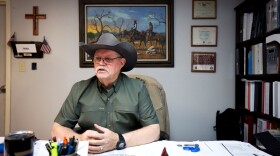A bill aimed at clarifying when doctors can perform emergency abortions passed the Texas House in a 129-6 vote Wednesday. Senate Bill 31 now needs one more procedural vote before it heads to Gov. Greg Abbott's desk.
The bill, also known as the Life of the Mother Act, was crafted with input from both physicians and anti-abortion groups — and sponsored by Rep. Bryan Hughes, the Mineola Republican who also authored the state's 2021 abortion ban.
"Every pro-life law that Texas has passed has recognized that when the life of the mother is in danger that is an exception," said Hughes while introducing the bill earlier this session.
In Texas, abortions are illegal except when a medical emergency occurs that threatens a woman's life or a "major bodily function." But doctors have said the language of the exception isn't clear enough, and leaves them unsure of what qualifies as an emergency and when they can legally act.
The bill's introduction followed reporting from ProPublica that found confusion surrounding Texas' abortion ban had resulted in the deaths of at least two women, as well as rising rates of sepsis in people who experience miscarriages.
SB 31 makes language about exceptions consistent across Texas' various overlapping abortion laws, clarifying that the risk of death or impairment does not have to be "imminent" for doctors to act. It says that discussions between doctors and their colleagues or patients while determining if abortion is the best treatment option is not considered to be "aiding and abetting" an illegal abortion under the law.
The measure also places the burden of proof on the state if a doctor is accused of performing an illegal abortion. Additionally, it tasks the Texas Medical Board with providing a continuing education course about the law for physicians.
The bill does not add any new exceptions for rape, incest or lethal fetal anomalies, though a recent study from the University of Houston showed a majority of Texans would support such exemptions.
"This is not a choice bill," said Rep. Charlie Geren, the Fort Worth Republican who carried the bill in the chamber, on the House floor Wednesday. "This bill addresses the life and health of the mother — period. That's it."
SB 31 received bipartisan support this legislative session. However, some abortion rights advocates spoke out against an earlier version of the bill. Their concerns centered on Texas abortion statutes dating back to the 1800s. Those statutes are technically still on the books, but courts are considering whether they are actually enforceable. By tweaking the language of those old statutes, advocates were concerned anti-abortion actors could argue the statutes were back in play — including a provision that anyone who "furnishes the means" for an abortion could be liable.
Before Wednesday's vote, some anti-abortion lawmakers said they worried the proposal would provide loopholes that would allow doctors to perform abortions.
Rep. David Lowe, a Republican from North Richland Hills, was one of six lawmakers who voted against it on second reading.
"This bill does not protect life, it weakens it," he said. "This bill loosens restrictions on the killing of unborn children."
SB 31's final, approved text includes amendments that say the bill is not taking a stance on the enforceability of the pre-Roe ban, quelling some of those earlier concerns.
But during Senate floor discussions in April, Hughes said he would not support a similar amendment for another abortion-related bill he sponsored — SB 2880, which takes aim at interstate abortion pill distribution. That proposal is still awaiting a committee hearing in the Texas House.
Copyright 2025 KUT 90.5






